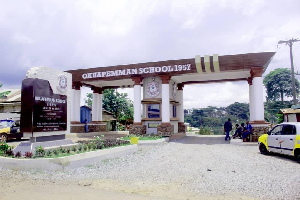Politics of Tuesday, 29 August 2006
Source: GNA
Rekindling interest in the district assembly concept
A GNA Feature by Hilda Abban
Cape Coast, Aug. 29, GNA - When the District Assembly concept initially took off more than a decade ago communities all over the country, eagerly looked forward to meetings with their assembly members, who would brief them on the deliberations and decisions taken during assembly meetings, pertaining to their welfare.
The people, in turn, then articulated their concerns and needs to their representatives, with regard to the provision of amenities like schools, toilets, water and electricity and markets, while they readily and eagerly, looked forward to, and participated in communal labour to improve their surroundings or for construction of projects to improve their socio-economic conditions.
Sadly, this collaboration between assembly members and the electorate has been waning for several years, resulting in the current situation that many communities, particularly those in the urban areas, do not even remember, or know whom their representatives at the assemblies are.
Assembly members now, hardly call meetings to brief their people about meetings and programmes at the assembly, and in most instances, even if they do, the electorate fail to turn up for the meetings, thereby nipping in the bud, a beautiful grassroots participatory democracy, which in the past, enabled the people to also have 91a say' in issues concerning them.
Both sides seem to have backslidden in their responsibilities in making the concept work effectively and for the electorate of many a community, the assembly man/woman is only seen, when they go back to them to ask to be re-elected when the time comes for district level elections. One cannot exactly pinpoint the actual factors for this trend, but it is known that some assembly members seem to be losing, or have completely lost the initial zeal with which they began to tackle their responsibilities. Assembly members and some members of the public have complained that the sitting and transport allowances paid them (assembly members) are too meagre and have to be reviewed. Similarly, the people also seem to have lost interest, or forgotten the important roles the assemblies play in socio-economic development, and this has become evident at the low turn out at the district level elections in the recent past.
During the elections, most polling stations are virtually empty and people just trickle in. It is always said that the turn out would pick up in the course of the day, but this hardly happens, as at the end of the polls, some stations have just about 30 per cent turn-out. The situation is indeed worrying, and is being compounded by the fact that although district level elections are supposed to be non-partisan, partisan politics, is increasingly and subtly rearing its head, threatening the assembly concept, which is geared toward enabling all Ghanaians to 91shed their political cloaks' and work in concert and unity to improve their conditions.
This situation, ignited the debate, which has continued raging, as to whether the elections must be made partisan, to the extent that it even compelled President John Agyekum Kufuor to wonder if the elections should not be made partisan.
Interestingly there have been diverse views expressed about this, with some people rooting for the elections to be made partisan, and others reiterating that the objectives for the assemblies should be maintained to enhance unity in development at the grassroots. The effectiveness of other structures like the unit committees, have also become an issue to grapple with. Another debate, as to whether district chief executives (DCEs) should also be elected, rages on and off. Startling incidents are reported to occur, during elections to confirm or reject the President's nomination of a DCE and it is feared that during such times, instead of the nominees being rejected or confirmed based on their known capabilities or otherwise, partisanship, again rears its ugly head, resulting in stand-offs, and the casting of ballots repeatedly, and in some cases, leading to violence. It is sometimes alleged that some assembly members have had to be bribed before a nominee finally gets the nod for the position. It is, therefore, pertinent to point out that there is the need to ensure that the objective for the setting up of the assemblies remain foremost in the minds of all Ghanaians, firstly, for the success of the decentralization process and most importantly for enhanced socio-economic development, in the country's determination to attain the goals spelt out in the Growth and Poverty-Reduction Strategy (GPRS II), as all as its commitment to global interventions like the Millennium Development Goals (MDGs).
The time has come for all stakeholders, to go back to the drawing board to evolve strategies towards enhancing the people's perceptions and understanding of the assembly concept.
It is the view of this writer that all assembly members should be brought abreast with their responsibilities, as spelt out in the Local Government Act. The public should be regularly sensitized about their crucial role in ensuring the success of the decentralization process. The issue of the use of the local language at the assembly meetings becomes very imperative, and it is important that all deliberations at the assemblies are efficiently interpreted or translated to enable the participation of all members.
The National Commission for Civic Education (NCCE) and the Information Services Department of the Ministry of Information and National Orientation should be adequately resourced to enable them to discharge their responsibilities effectively.
The media also have a crucial role to play in ensuring that apathy, does not gradually lead to the collapse of the district assembly concept. Publicity should especially be stepped up within this period whip up the interest of the people to turn out in their numbers to cast their vote in the September 12 2006 District Level Elections to strengthen the grassroots governance structures.










